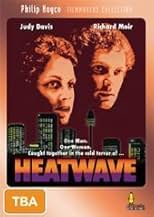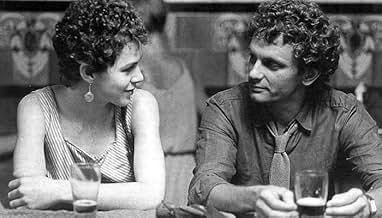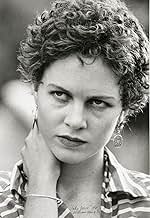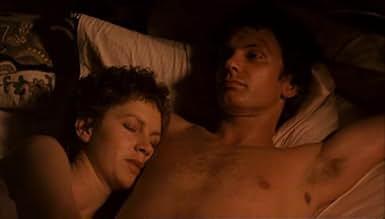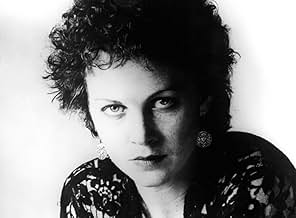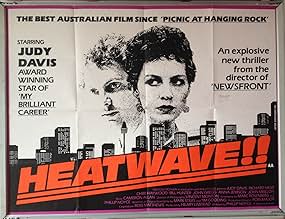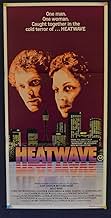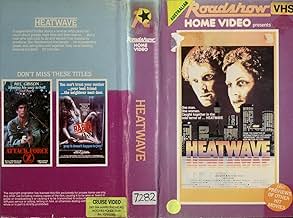A planned housing development in the mid 70's designed for an upstart Cockney immigrant developer, becomes the centre of controversy as tenants and squatters in the older houses refuse to mo... Read allA planned housing development in the mid 70's designed for an upstart Cockney immigrant developer, becomes the centre of controversy as tenants and squatters in the older houses refuse to move.A planned housing development in the mid 70's designed for an upstart Cockney immigrant developer, becomes the centre of controversy as tenants and squatters in the older houses refuse to move.
- Awards
- 1 win & 3 nominations total
Anna Maria Monticelli
- Victoria West
- (as Anna Jemison)
Featured reviews
And subject too. This plot, topic, could be adapted to any country, because the issues, elements it talks about could happen anywhere in a big town. But besides this, I am not that surprised that it was not released in France. As far as I know, Philip Noyce's first film shown in France was DEAD CALM, back in 1989. And this director began his career in 1971 !!! No one in France ever saw those early films in movie theaters. This one is a good drama and character study, relation analysis. I am happy to have discovered it, though it is not really my cup of tea. I guess the Aussie movie industry - and not only Australia - has many more of such gems in its vaults.
These days, "Heatwave" is a pretty much totally forgotten film, but it's hard to see exactly why that is. Regardless of how the storyline might personally appeal to you, it's an exceedingly well-made and acted film. Judy Davis (in one of her very first roles) creates a very compelling character, a lonely and driven personality that begs you to follow along in her obsession. The setting - a heatwave over the Christmas/New Year season - helps the dramatic sense immensely, though it may be a bit disconcerting to the snowbound North American viewer. Richard Moir is also very good here, an actor who spent most of his career playing invisible roles in invisible movies.
Phillip Noyce went on to do a lot more well-known films, and he's a huge part of what brings it all together. In spite of that, he's goes too far on certain visual manipulation in a film that never really invites it. There's a political edge to the screenplay, which tends to push the viewer away, but a personal side that draws you in. For someone personally engaged in the subject matter, this would be a perfect film. And I liked it a lot.
Phillip Noyce went on to do a lot more well-known films, and he's a huge part of what brings it all together. In spite of that, he's goes too far on certain visual manipulation in a film that never really invites it. There's a political edge to the screenplay, which tends to push the viewer away, but a personal side that draws you in. For someone personally engaged in the subject matter, this would be a perfect film. And I liked it a lot.
I do enjoy this film, but Noyce has made much better ones. The weak drippy story of one courageous woman (who better than Judy Davis to play it) hitting back at wealthy hot shot developers, who want to pull down her residence, amongst a row of other two storey tenements, so they can put up new wave apartments, where underneath some real corruption, and shady characters (prominently Peter Hehir's one) isn't the best story pitch in the world. And too, we are in the midst of a real heatwave, in Sydney, something uncommon in this city today. The story takes place in December, and in Surry Hills or Paddington, if I'm correct as knowing Sydney spots well. Pity. We have a line up of a great cast, who honestly don't have much to work with. Judy Davis, brilliant, who like, Pacino, always has her moments, a particular scene or that, you remember the actor for. She definitely makes her stand here. The day of departure, will be a great falling for the Oz entertainment industry. Moir too, as one of the rivalling major developers, an ace architect, who falls for Davis, is an appreciated talent here, we wish we could of only seen him in more stuff. We too have the fantastic John Meillion, who left us too soon. And how can you not have a film without Chris Haywood, asked as a question or a fact. Him singing road to Gundagai, while promoting an campaign advertisement in the back of a limo, is just a classic frame shot, among many in Australian cinema. And too, the lead up to New Years, with Moir chasing Davis through a sea of people is great, visually, directed by a ace who knows how to capture moments. Not only that, we have a couple of violent scenes, one in particular, the blood looking more like dripped wine. We even see a Sliver star amongst the tenants. With all this going for it, inevitably, it's the story that's failed us, and to add, a stupid and unbelievable confirmation ending. Still this film would have wide appeal, if given a viewing, of favourable appeal from Aussies who have already seen it.
This classic Australian film by veteran director Phillip Noyce probably deserves more credit than it gets. It's not as good as Noyce's recent Rabbit-Proof Fence or 1978's Newsfront, but the talent it has to offer is quite impressive with stars such as Judy Davis and Bill Hunter. It won't appeal to everybody, but it's still worth a look at - especially if you're into the Australian film industry.
Urban redevelopment in Sydney, Australia circa the early 1980's with a dark twist of violence and a moody soundtrack, nicely filmed in color, all set during the summer/Holidays, taking place sometime during the days leading up to Christmas to a crazy and out of control looking New Year's Eve in the midst of a brutal heatwave. Weaving in and out of topless bars, squatter's rights, construction unions, murder, seeping groundwater, and ruthless high rise corporations. It's sort of a story of the haves against the have-nots with Judy Davis as a leader of a group of squatters who are literally thrown out of their building by thugs to make way for a new development named Eden, and Richard Moir as the idealist architect who's designed the project. Of course they get to know each other rather intimately as Moir's character finds out about the greedy developers who back his design. There is quite a bit of politics, but Philip Noyce, the director who gave us Dead Calm, steers everything into a pretty intense concluding segment culminating in a very big rainstorm.
Did you know
- TriviaThis movie was made and released about seven years after the disappearance and alleged death of Juanita Joan Nielsen (22 April 1937 - est. c. July 4, 1975).
- ConnectionsFeatured in Sweating It Out: The Making of Heatwave (2007)
Details
- Runtime1 hour 31 minutes
- Sound mix
- Aspect ratio
- 1.85 : 1
Contribute to this page
Suggest an edit or add missing content


